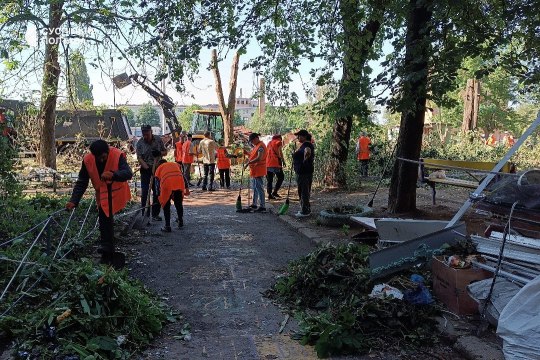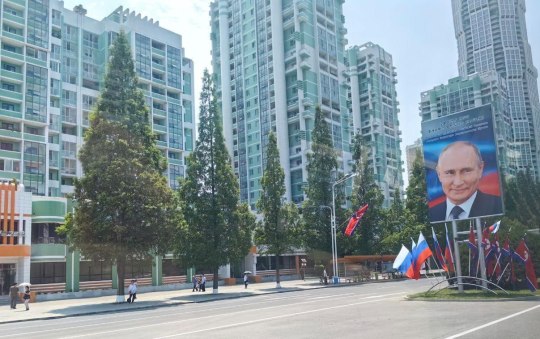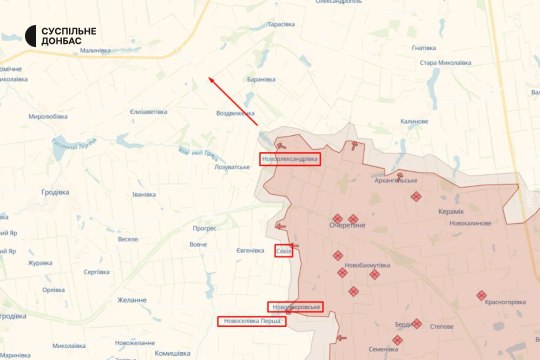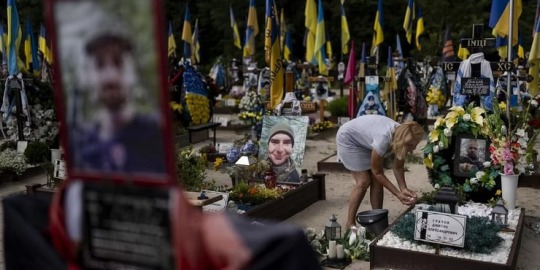#Press Council of India
Explore tagged Tumblr posts
Text
T20 World Cup, Surprising Confession from Haris: Saim, Azam, Afridi, Usman | Tabi Leaks

#tabii leaks#tabi leaks punjabi#pakistani players#haris rauf#pak vs eng#eng vs pak#pakistan cricket team#pakistan team#asian cricket council#pakistan cricket board#pak live match#cricket pakistan#pakistan cricket#asia cup pakistan cricket#pakistan cricket official#babar azam#asia cup pakistan#asia cup pakistan india#asia cup press conference#asia cup latest#real pcb#gadaffi stadium#asia cup updates#pcb#t20i#odi#asia cup#Azam Khan I enjoy cricket
0 notes
Text
Unpunished evil returns and grows stronger in its impunity

"13 houses in the residential area were damaged during the rocket attack, the houses have five floors. There is a very large number of broken windows, over 700. Seven humanitarian buildings were damaged," said Kateryna Yamshchikova, Secretary of the Poltava City Council, about the consequences of the missile attack in Poltava on June 17.
Utilities and rescuers are working at the site. They are trimming damaged trees and removing balcony structures. Social workers and psychologists are also assisting.
Also, Vadym Labas briefly explains why certain countries that arrived at the Global Peace Summit in Switzerland did not sign a joint declaration.
▪️ Saudi Arabia is a major hub for the transfer of components and units for Russian weapons, as well as a place of accumulation of billions of Russian money. ▪️ India - supplies units and components to Russia. It has joint military-industrial complex plants with Russia, from assault rifles to missiles. It is a hub for transshipment of Russian oil. ▪️ South Africa - everything is clear here: "Wagner", money and influence. ▪️ Thailand - supplies sanctioned products to Russia and also helps the Russian military-industrial complex with its production. For example, Russia could not produce cable products without Thailand. ▪️ Indonesia - supplies sanctioned products to Russia. ▪️ Mexico is a huge hub for the supply of drugs to Europe and Russian agents to the United States, which generates huge shadow earnings. ▪️ United Arab Emirates - helps to supply sanctioned products to Russia and has a lot of Russian money. ▪️ Armenia - has a huge Russian lobby and is one of the key players in the supply of smuggled military-industrial products to Russia.
All this brings super-profits either to these countries themselves or to influential clans in these countries. Therefore, they are quite satisfied with the current situation.
P.S.: these countries came to the Summit to "keep their finger on the pulse," but they are not interested in peace in Ukraine because they make super profits by helping Russia circumvent sanctions and supplying components. But if they were given a clear signal about the secondary sanctions that could be imposed for helping Russia, their "pulse rate" would increase significantly.


DPRK prepares for the arrival of the world's evil.
Now the most important news: The ratio of forces in the Pokrovsk sector is 1 to 7 in favor of the Russians, said a soldier of the 47th Brigade, pseudonym "Azimuth".

Photo: Approximate front line in the Pokrovsk sector/DeepStateMap.
The Russians are pressing near the villages of Novoselivka Persha, Sokil, and Novopokrovske, trying to reach the Pokrovsk-Konstantynivka highway.
Don't be indifferent. Make Russia pay. Please hear our cry out to the world, keep spreading our voices, and donate to our army and combat medics (savelife.in.ua, prytulafoundation.org, Serhii Sternenko, hospitallers.life, ptahy.vidchui.org, and u24.gov.ua).
#ukraine#poltava#donetsk#genocide#stop the genocide#russia is a terrorist state#russian invasion of ukraine#russo ukrainian war#make russia pay#russia must burn#war in ukraine#current events#world news#important#signal boost#stand with ukraine#donate if you can#please donate#donations#український tumblr#український тамблер#arm ukraine
38 notes
·
View notes
Text
[ 📹 Despite the widespread destruction caused by the Israeli genocide, ongoing in the Gaza Strip, and despite the Zionist entity's destruction of all Mosques in Gaza, the resilience and determination of Palestinians, strong in their Muslim faith, cannot be diminished as a Palestinian man calls for morning prayers while standing stop the rubble of demolished homes in the city of Khan Yunis, south of Gaza. ]
🇮🇱⚔️🇵🇸 🚀🏘️💥🚑 🚨
261 DAYS OF ISRAELI GENOCIDE IN GAZA: INDIA PROVIDING MUNITIONS TO THE ZIONIST ENTITY SINCE START OF WAR, PROTESTS GRIP TEL AVIV, NETANYAHU CLAIMS US DECREASES WEAPONS SUPPLIES, UNRWA: 69% OF SCHOOLS HOUSING DISPLACED PALESTINIANS HAVE BEEN BOMBED, GENOCIDE GOES ON
On 261st day of the Israeli occupation's ongoing special genocide operation in the Gaza Strip, the Israeli occupation forces (IOF) committed a total of 3 new massacres of Palestinian families, resulting in the deaths of no less than 47 Palestinian civilians, mostly women and children, while another 121 others were wounded over the previous 24-hours.
It should be noted that as a result of the constant Israeli bombardment of Gaza's healthcare system, infrastructure, residential and commercial buildings, local paramedic and civil defense crews are unable to recover countless hundreds, even thousands, of victims who remain trapped under the rubble, or who's bodies remain strewn across the streets of Gaza.
This leaves the official death toll vastly undercounted as Gaza's healthcare officials are unable to accurately tally those killed and maimed in this genocide, which must be kept in mind when considering the scale of the mass murder.
The Zionist entity has sent Defense Minister Yoav Gallant to the United States on a reconciliation tour after video released by the occupation Prime Minister, Benjamin Netanyahu, over the weekend accused the United States of decreasing weapons transfers to the Israeli occupation army.
Gallant will meet with senior Biden administration officials to discuss security issues, including the slow down of arms transfers to the Zionist entity, while the US administration continues to express concern over a planned visit by Netanyahu where he will give a speech before the United States Congress.
According to reporting in the Hebrew media, the Biden administration remains concerned that the Israeli Prime Minister could attack the administration during his speech before Congress for the supposed slow-down of arms transfers, which the White House still denies.
Despite intense push-back from the Biden administration, Netanyahu stuck by his criticisms at a Cabinet meeting on Sunday, continuing to accuse the US administration of slow-rolling munitions sales to the Zionist entity.
"Netanyahu's video was puzzling, to say the least," said John Kirby, spokesman for the National Security Council at the White House, speaking at a press conference on Saturday.
"We did not know that this video would be published, and the statements made in it disturb and disappoint the United States, especially considering that no other country is doing more than us to help Israel defend itself against the threat of Hamas. Netanyahu's statements about the supply of weapons were incorrect. Israel will not be harmed by our new priorities," Kirby added.
Meanwhile, back at home, the Netanyahu administration endures large-scale protests calling for a hostage exchange deal to be settled, with tens of thousands of Israelis spilling out onto the streets of Tel Aviv on Saturday night.
Organizers said it was the largest anti-government protest to date, while video from the protests showed violent police suppression, some on horseback, with dozens arrested during the night after the protesters blocked the city's main highway.
Protesters say they demand their government negotiate a hostage exchange deal, even if it means ending the war in the Gaza Strip.
On October 7th, 2023, Palestinian resistance factions broke out of the outdoor prison that is the Gaza Strip, raiding Israeli settlements and taking approximately 120 hostages back to the enclave.
By some estimates, just 50 of those hostages remain alive after 9 months of Israeli bombardment of the Gaza Strip, which according to the Hamas resistance group, has killed roughly half of the hostages.
Meanwhile, as the Israeli assault on the Gaza Strip continues, the United Nations Relief and Works Agency for Palestinian refugees (UNRWA) has issued a statement declaring that 69% of the UNRWA schools in Gaza that housed displaced Palestinian families during the war have been bombed by the Israeli occupation army, leaving them either destroyed or partially damaged.
The UNRWA made the announcement via its account on the social media platform X, stating that according to the Global Education Cluster, an educational organization affiliated with UNICEF, "69% of school buildings where displaced families were seeking shelter have been directly hit or damaged."
"This blatant disregard of humanitarian law must stop. We need a ceasefire now," UNRWA added.
In other news, according to the Hebrew media site Yedioth Ahronoth (Ynet), India has been providing the Israeli occupation with munitions since the very start of the war in Gaza, delivering countless tons of military aid to the Zionist army.
"India stands firm in its support of Israel amid the war in Gaza and supplies it with advanced drones made in the country despite growing Pro-Palestinian calls from its Muslim demographic," the Ynet article states.
According to the article, back in May, Spanish authorities prevented an Indian ship carrying over 27 tons of munitions destined for the ports of occupied Palestine from docking at the port of Cartagena in southeast Spain.
"The incident highlights the fact that India has been providing significant military assistance to Israel since October 7th," Ynet said in the piece.
Back in February, the Indian media reported that India was supplying the Israeli entity with advanced Hermes 900 drones, which are manufactured in the Indian city of Hyderabad.
Ynet says the Indian media reported that the factory, which was established by the Zionist entity to supply the Hermes drones to the Indian military, converted at least 20 of the drones specifically for the occupation army due to a shortage resulting from the war in Gaza.
Meanwhile, the Zionist entity continues its genocide against the Palestinian population of the Gaza Strip, slaughtering civilians by the hundreds each week and obliterating the enclave's medical and public infrastructure.
On Sunday morning, June 23rd, local media reported that at least 5 Palestinian civilians were killed as a result of the Israeli occupation's bombardment of central and western Gaza City.
In one of the incidents, a correspondant with Palestinian news agency WAFA reported that Zionist warplanes bombed a residential building near the Al-Jawhara Tower in central Gaza City, resulting in the deaths of 3 Palestinians and wounding several others, including women and children.
Similarly, two civilians were killed, and a number of others injured, as a result of an Israeli air raid targeting a residential house in the Al-Shati Refugee Camp, also known as the Beach Camp, west of Gaza City.
Additionally, the Israeli occupation army intermittently bombed the center and south of Rafah, in the southern Gaza Strip.
As a result of the Israeli occupation's ongoing bombardment of residential neighborhoods of Gaza City, at least 43 Palestinians were killed on Saturday according to local healthcare sources, while scores of others were wounded in Zionist airstrikes and artillery shelling.
The mass murder continued when the Israeli occupation forces on Sunday bombed a residential house in the Al-Sabra neighborhood, south of Gaza City, massacreing 8 civilians and wounding dozens of others.
Simultaneously, the Israeli occupation army also used a drone to bomb a gathering of civilians near the power station north of the Nuseirat Refugee Camp, in the central Gaza Strip, killing two Palestinians and injuring several others.
Similarly, Zionist artillery shelling pummeled the western and southern neighborhoods of Rafah, south of Gaza, while Zionist soldiers detonated a number of residential buildings in the Brazil neighborhood, south of Rafah, continuing the systematic destruction of residential areas of the city after deconstructing nearly the entire Saudi neighborhood.
According to local reports, in the city of Rafah, the Israeli occupation forces have destroyed hundreds of homes in the Saudi neighborhood in the west and center of the city, detonating entire residential squares using explosives.
The Israeli occupation's massacres and atrocities continued with the Zionist army's bombing of the main eastern gate for the headquarters of the UNRWA, southwest of Gaza City, slaughtering at least 5 civilians and wounding 7 others.
According to local reporting, Zionist warplanes targeted the guard room at the main eastern gate for the UNRWA headquarters in the Tal al-Hawa neighborhood, southwest of Gaza City, resulting in the deaths of 5 Palestinians, some of whom were "dismembered" by the attack, and also wounding 7 others, including women and children who were transported to Al-Ahli Baptist Hospital in the city.
Prior to publishing, another news alert was issued by WAFA News Agency, reporting that the Zionist army had bombed in the vicinity of the tents of displaced Palestinian families near the Vocational Training College of the UNRWA, west of Gaza City, murdering at least 8 Palestinians.
Another strike by the Israeli occupation forces targeted residential areas of the Al-Sabra neighborhood, south of Gaza City, killing 9 more civilians and wounding several others.
According to local Civil Defense crews, rescue efforts recovered the bodies of 3 Palestinians and several wounded civilians as a result of Zionist fighter jets that bombed a residential house belonging to the Ja'rour family, in the vicinity of the Dabit area of central Gaza City.
Meanwhile, in the Bureij Camp, in the central Gaza Strip, a female Palestinian civilian was killed, and several others wounded, as a result of an Israeli occupation airstrike on the "Meet" family home in the Camp, while another strike on a group of civilians in the Nuseirat Camp killed one Palestinian and wounded a number of others.
As a result of the Israeli occupation's ongoing war of extermination in the Gaza Strip, the infinitely rising death toll now exceeds 37'598 Palestinians killed, including upwards of 10'000 women and over 15'000 children, while another 86'032 othrrs have been wounded as a result of the current round of Zionist aggression, beginning with the events of October 7th, 2023.
June 23rd, 2024
#source1
#source2
#source3
#source4
#source5
#source6
#source7
#source8
#source9
#videosource
@WorkerSolidarityNews
#gaza#gaza strip#gaza news#gaza war#gaza genocide#war in gaza#genocide in gaza#israeli genocide#israeli war crimes#genocide#war crimes#crimes against humanity#israeli occupation#israeli occupation forces#occupation#palestine#palestine news#palestinians#free palestine#gaza conflict#middle east#war#politics#news#geopolitics#international news#global news#breaking news#israel#current events
32 notes
·
View notes
Text







On December 2nd 1971 the last two permanently resident families leave the island of Scarp, off Harris in the Western Isles.
It was 52 years ago this week that the last native residents evacuated the island of Scarp with a family leaving on a small boat packed with furniture as their two cows swam behind them. The departure of Mr and Mrs Angus MacInnes and their two sons marked the end of an era on the island which was home to more than 200 people in the late 19th Century.
A newspaper report documented the exit of the MacInnes family, who came ashore half-a-mile away at Hushinish Beach on Harris before settling on a croft at Govig.
The article, printed in the Press and Journal, noted how the island was then “left to the Old Etonians” given its remaining residents were Andrew Miller Mundy, whose father once owned the North Harris Estate, and his school friend Andrew Cox, who temporarily moved to the island earlier that year with his wife and their baby, India.
After the MacInnes family left, life on Scarp continued for several more weeks until a heavy storm cut the island off with provisions running ‘dangerously low’. Mundy, in London at the time, sent a helicopter in to rescue his girlfriend, a model who he later married, with food also choppered into Scarp - just in time for Christmas.
Mundy later relocated permanently to Harris, trained himself to catch lobsters and worked the waters around St Kilda for a decade. He became a popular figure to many, representing Harris at council level for many years and was admired for his dedication to wildlife and conservation. Scarp, meanwhile, has seen little human life since the early 1970s. Those who inherited the island’s crofting rights still keep sheep on Scarp with rams taken over for tupping and lambs returned to Stornoway for sale in September.
The ruins of several old buildings remain scattered over the island with a handful of holiday homes bringing in visitors from time to time.
From a high of over 200 the population of Scarp was still a relatively healthy 100-150 at the turn of the 20th Century. The island is rocky and the north part is over 300m in height with a steep drop to the sea. The village, which is now in serious disrepair is located in the south-east corner where it is partly sheltered from the Atlantic winds. The only land capable of cultivation is near the village on the east coast. The local economy would have been very basic - potatoes, cabbages, oats, milk, fish. Billingsgate market in London would have been the destination for much of the lobster caught by the Scarp fishermen.
The village on Scarp had no electricity and the only means of illumination would have been oil lamps. There was piped water and the village did have a small shop. The telephone line was installed in 1947. Despite these few basic comforts Scarps population like so many other small islands around Scotland continued to decline. In 1966 the Church of Scotland refused to replace the lay preacher and a year later the village school closed. Two years later it was the Post Offices turn to close its doors for the last time and with it so ended all mail deliveries to and from the island.
As the islands infrastructure continued to deteriorate the next thing to go was the telephone cable. This was severed in a storm and the GPO simply refused to repair it. This was just about the last straw for the remaining islanders.
The people may have left but Scarp still gets mentioned in many a conversation to due the adventures of German rocket scientist Gerhard Zucher. The German boffin attempted to develop a rocket which could 'fire' mail from Scarp to Harris and vice versa. Unfortunately the first launch simply exploded on the spot. A second firing from Harris to Scarp was a success but the project was quickly forgotten....but still very much lingers in the legends and stories of Scarp.
Although there are no permanent residents, a handful of holiday homes still welcome visitors
37 notes
·
View notes
Text
Russia vetoed a United Nations Security Council resolution Wednesday that would have reaffirmed a nearly 50-year-old ban on placing weapons of mass destruction into orbit, two months after reports Russia has plans to do just that.
Russia's vote against the resolution was no surprise. As one of the five permanent members of the Security Council, Russia has veto power over any resolution that comes before the body. China abstained from the vote, and 13 other members of the Security Council voted in favor of the resolution.
If it passed, the resolution would have affirmed a binding obligation in Article IV of the 1967 Outer Space Treaty, which says nations are "not to place in orbit around the Earth any objects carrying nuclear weapons or any other kinds of weapons of mass destruction."
Going Nuclear
Russia is one of 115 parties to the Outer Space Treaty. The Security Council vote Wednesday follows reports in February that Russia is developing a nuclear anti-satellite weapon.
"The United States assesses that Russia is developing a new satellite carrying a nuclear device," said Jake Sullivan, President Biden's national security advisor. "We have heard President Putin say publicly that Russia has no intention of deploying nuclear weapons in space. If that were the case, Russia would not have vetoed this resolution."
The United States and Japan proposed the joint resolution, which also called on nations not to develop nuclear weapons or any other weapons of mass destruction designed to be placed into orbit around the Earth. In a statement, US and Japanese diplomats highlighted the danger of a nuclear detonation in space. Such an event would have "grave implications for sustainable development, and other aspects of international peace and security," US officials said in a press release.
With its abstention from the vote, "China has shown that it would rather defend Russia as its junior partner, than safeguard the global nonproliferation regime," said Linda Thomas-Greenfield, the US ambassador to the UN.
US government officials have not offered details about the exact nature of the anti-satellite weapon they say Russia is developing. A nuclear explosion in orbit would destroy numerous satellites—from many countries—and endanger astronauts. Space debris created from a nuclear detonation could clutter orbital traffic lanes needed for future spacecraft.
The Soviet Union launched more than 30 military satellites powered by nuclear reactors. Russia's military space program languished in the first couple of decades after the fall of the Soviet Union, and US intelligence officials say it still lags behind the capabilities possessed by the US Space Force and the Chinese military.
Russia's military funding has largely gone toward the war in Ukraine for the last two years, but Putin and other top Russian officials have raised threats of nuclear force and attacks on space assets against adversaries. Russia's military launched a cyberattack against a commercial satellite communications network when it invaded Ukraine in 2022.
Russia has long had an appetite for anti-satellite (ASAT) weapons. The Soviet Union experimented with "co-orbital" ASATs in the 1960s and 1970s. When deployed, these co-orbital ASATs would have attacked enemy satellites by approaching them and detonating explosives or using a grappling arm to move the target out of orbit.
In 1987, the Soviet Union launched an experimental weapons platform into orbit to test laser technologies that could be used against enemy satellites. Russia shot down one of its own satellites in 2021 in a widely condemned "direct ascent" ASAT test. This Russian direct ascent ASAT test followed demonstrations of similar capability by China, the United States, and India. Russia's military has also demonstrated satellites over the last decade that could grapple onto an adversary's spacecraft in orbit, or fire a projectile to take out an enemy satellite.
These ASAT capabilities could destroy or disable one enemy satellite at a time. The US Space Force is getting around this threat by launching large constellations of small satellites to augment the military's much larger legacy communications, surveillance, and missile warning spacecraft. A nuclear ASAT weapon could threaten an entire constellation or render some of space inaccessible due to space debris.
Russia's ambassador to the UN, Vasily Nebenzya, called this week's UN resolution "an unscrupulous play of the United States" and a "cynical forgery and deception." Russia and China proposed an amendment to the resolution that would have banned all weapons in space. This amendment got the support of about half of the Security Council but did not pass.
Outside the 15-member Security Council, the original resolution proposed by the United States and Japan won the support of more than 60 nations as co-sponsors.
"Regrettably, one permanent member decided to silence the critical message we wanted to send to the present and future people of the world: Outer space must remain a domain of peace, free of weapons of mass destruction, including nuclear weapons," said Kazuyuki Yamazaki, Japan's ambassador to the UN.
5 notes
·
View notes
Text

REAL ESTATE PROFITEERING
The real estate sector in India, particularly in cities like Gurgaon, Mumbai, and Bengaluru, has witnessed unprecedented profits, with some reports suggesting a staggering 5000% profit margin. This has led to a situation where the prices of apartments, even 3.5 BHK or 5.5 BHK, have skyrocketed, making them unaffordable for the average working-class individual.
The prices of luxury apartments in Gurgaon, for instance, have reached an all-time high, with some properties costing upwards of ₹36 crore. This price rise has been fueled by the growing demand for luxury housing, coupled with the limited availability of land and infrastructure. The situation is similar in Mumbai and Bengaluru, where the prices of apartments have increased exponentially over the past few years.
The impact of this price rise on the average working-class individual has been devastating. Many are finding it difficult to afford even the most basic of apartments, let alone luxury ones. The rent prices have also increased significantly, making it difficult for people to find affordable accommodation. This has led to a situation where many are being forced to live in slums or on the streets, highlighting the dire need for affordable housing in these cities.
The Indian government has taken some steps to regulate the real estate sector and control profiteering. The Goods and Services Tax (GST) Council has implemented anti-profiteering measures to ensure that businesses pass on the benefits of reduced tax rates to consumers. The National Anti-Profiteering Authority (NAA) has also been established to investigate cases of profiteering and impose penalties on businesses that fail to comply with the anti-profiteering provisions ¹.
However, more needs to be done to control the price rise and ensure that housing is affordable for all. One possible solution is to increase the supply of land and infrastructure, which would help to reduce the prices of apartments. The government could also consider implementing policies to control the price rise, such as imposing a ceiling on the prices of apartments or providing incentives to developers who build affordable housing.
In conclusion, the profiteering in the real estate sector in cities like Gurgaon, Mumbai, and Bengaluru is a pressing issue that needs to be addressed. The government, developers, and other stakeholders must work together to ensure that housing is affordable for all and that the prices of apartments do not rise exponentially.
*Possible Solutions:
*_Increase Supply of Land and Infrastructure:_ The government could consider increasing the supply of land and infrastructure, which would help to reduce the prices of apartments.
*_Implement Price Control Measures:_ The government could consider implementing policies to control the price rise, such as imposing a ceiling on the prices of apartments or providing incentives to developers who build affordable housing.
*_Promote Affordable Housing:_ The government could consider promoting affordable housing by providing incentives to developers who build affordable housing or by implementing policies that encourage the development of affordable housing.
*_Regulate the Real Estate Sector:_ The government could consider regulating the real estate sector more effectively, including implementing stricter penalties for developers who engage in unfair practices.
Article by
Madhusudan Lal
Blogger
(Copy Rights Reserved)
Sourced:
#real estate#profiteering#gst#gurgaon#artoons18#pmoindia#homeminister#indianrealestate#pmo#finance minister#finance#rbi governor#rbi
1 note
·
View note
Text
[...]
In the meantime, while Iran was coordinating with the resistance groups on the military front, China and Saudi Arabia shifted gear on the diplomatic track. On Thursday, even as the US Secretary of State Antony Blinken was heading for Arab capitals after talks in Tel Aviv, seeking help to get the hostages released by Hamas, China’s Special Envoy on the Middle East Zhai Jun contacted the Deputy Minister for Political Affairs of the Saudi foreign ministry Arabia Saud M. Al-Sati on the Palestine-Israel situation with focus on the Palestine issue and the humanitarian crisis unfolding in Gaza, in particular. The contrast couldn’t be sharper.
On the same day, an extraordinary event took place in the Chinese foreign ministry when the Arab envoys in Beijing sought a group meeting with Special Envoy Zhai to underscore their collective stance that a “very severe” humanitarian crisis has emerged following Israel’s attack on Gaza and “the international community has the responsibility to take immediate actions to ease the tension, promote the resumption of talks for peace, and safeguard the Palestinian people’s lawful national rights.”
The Arab ambassadors thanked China “for upholding a just position on the Palestinian question … and expressed the hope that China will continue to play a positive and constructive role.” Zhai voiced full understanding that the “top priority is to keep calm and exercise restraint, protect civilians, and provide necessary conditions for relieving the humanitarian crisis.”
After this extraordinary meeting, the Chinese Foreign Ministry posted on its website at midnight a full-bodied statement by Member of the Political Bureau of the CPC Central Committee and Foreign Minister Wang Yi titled China Stands on the Side of Peace and Human Conscience on the Question of Palestine. This reportedly prompted a call by the Saudi Foreign Minister Prince Faisal bin Farhan to Wang Yi.
Interestingly, Blinken too called Wang Yi from Riyadh on October 14, where, according to the state department readout, he “reiterated U.S. support for Israel’s right to defend itself and called for an immediate cessation of Hamas’ attacks and the release of all hostages” and stressed the importance of “discouraging other parties (read Iran and Hezbollah) from entering the conflict.���
Succinctly put, in all these exchanges involving Saudi Arabia — especially, in Blinken’s meetings in Riyadh with Saudi FM and Crown Prince Mohammed bin Salman, while the US focused on the hostage issue, the Saudi side instead turned the attention to the humanitarian crisis in Gaza. The state department readouts (here and here) bring out the two sides’ divergent priorities.
Suffice to say, a coordinated Saudi-Iranian strategy backed by China is putting pressure on Israel to agree to a ceasefire and to de-escalate. The UN’s backing isolates Israel further.
Benjamin Netanyahu’s exit is to be expected but he won’t throw in the towel without a fight. US-Israel ties may come under strain. President Biden is caught in a bind, harking back to Jimmy Carter’s predicament over the Iran hostage crisis in 1980, which ended his bid for a second term as president. Biden is already backtracking.
Where do things go from here? Clearly, the longer the Israeli assault on Gaza continues, the international condemnation and demand to allow a humanitarian corridor will only intensify. Not only will countries like India which expressed “solidarity” with Israel lose face in the Global South, even Washington’s European allies will be hard-pressed. It remains to be seen whether an invasion of Gaza by Israel is anymore realistic at all.
Going forward, the Arab-Iran-China axis will raise the plight of Gaza in the UN Security Council unless Israel retracted. Russia has proposed a draft resolution and is insisting on a voting. If the US vetoes the resolution, the UN GA may step in to adopt it.
Meanwhile, the US project to resuscitate the Abraham Accords loses traction and the plot to undermine the China-brokered Saudi-Iranian rapprochement faces sudden death.
As regards the power dynamic in West Asia, these trends can only work to the advantage of Russia and China, especially if the BRICS were to take a lead role at some point to navigate a Middle East peace process that is no longer the monopoly of the US. This is payback time for Russia.
The era of petrodollar is ending — and along with that, the US’ global hegemony. The emergent trends, therefore, go a long way to strengthen multipolarity in the world order.
7 notes
·
View notes
Text
Hamas is not the Palestinian people. Hamas is a terrorist organization that came to power in Gaza in 2006.
For the Christian
youtube
Johnnie Moore's International religious liberty bio from Wikipedia:
China:
Moore condemned China’s treatment of Muslims in 2017 and wrote an open letter to the Chinese premier alongside of Rabbi Abraham Cooper from the Simon Wiesenthal Center.[8] In May 2021, the People's Republic of China issued retaliatory sanctions against Moore that banned him from entering the territory that it controls the United States issued sanctions against a Chinese official for the official's involvement in the detention of Falun Gong pratcitioners.[9][10][11]
Middle East:
In 2017 Moore joined the Los Angeles Museum of Tolerance Press Conference calling for tolerance and the end of bigotry.[12][13] Moore played a key role in the release of the historic Bahrain Declaration calling for rights for religious minorities in the Middle East. Days after the move of the Jerusalem embassy more led a multi-faith peace delegation from the Kingdom of Bahrain on a pilgrimage in Jerusalem.[13] Moore’s Bahraini trip to Jerusalem prompted his being listed on the electronic intifada for allegedly forging and alliance between Bahrain and Israel in defiance of the Arab boycotts of Israel.[14][15]
Moore met and raised awareness of human rights issues with the Saudi CP within weeks of the death of Khashoggi.[16] He also visited the country on 9/11 and is an advocate of the Crown Prince’s Vision 2030 reform agenda.[17] Moore participated in the announcement of the first ever Chief Rabbi for the United Arab Emirates[18] and held meetings with heads of state throughout the Islamic world with the Crown Prince of the United Arab Emirates in 2018[19] as well as advocating for persecuted Hindus in India.[20] He now serves on the ADL Task Force for Protecting Minority Groups in the Middle East.[21]
Moore praised the Kingdom of Jordan for its interfaith efforts[22] as well as praising the President of Azerbijain as a model of peaceful coexistence.[23] He has also met with Israeli Prime Minister Benjamin Netanyahu and various Palestinian leaders,[24] the President of Azerbaijan,[25][26] and twice with the Crown Prince of the Kingdom of Saudi Arabia in 2019 and 2018[27][28] and he has met with the World Council of Churches.[29]
Moore referred to the ISIS threat against Christians in Iraq and Syria as a “once in a 1000 year threat to Christianity.”[30] He chartered a private jet and organized the evacuation and resettlement of ISIS victims from Northern Iraq to Slovakia over Christmas in 2015, a first in a series of efforts that eventually resettled over 10,000 Christian and Yazidi refugees displaced by ISIS.[31][32] On September 11, 2019 he joined forces with Muhammad Alissa of the Muslim World League to issue a joint statement calling for cooperation between evangelicals like Moore and Muslims with a focus on protecting Christian holy sites.[33] Moore is a critic of Iran and has called for the Iranian people to take back their religion from their supreme leader.[34][35] He praised Pakistan’s prime minister for the arrest of a leading terrorist[20] and in 2019 his advocacy was credited for the release of an 82-year-old Muslim prisoner of conscience in Pakistan, Abdul Shakoor.[36][37]
Moore was among an evangelical delegation who met with Egyptian government officials[38][39] and was the guest of Egypt’s president for the grand opening of the Middle East’s largest cathedral.[40]
North Korea:
Moore was involved in bringing together liberal, moderate and conservative evangelicals in a joint call for prayer for peace in North Korea.
Terrorism Primer
youtube

Peace Process Primer
youtube
youtube
#terrorism#hamas#israel#heartbreaking 💔#evil#pray for the peace of jerusalem#open borders#religious liberty#soros#Youtube
6 notes
·
View notes
Text
Lula, Who Has already Considered Appealing to The ICC, Says He 'Didn't even Know about The Existence' of The Hague Court
The PT member guaranteed that Vladimir Putin, the subject of the court's arrest warrant, would not be detained if he came to Brazil

President Luiz Inácio Lula da Silva (PT) stated this Monday (11) that he did not know about the existence of the International Criminal Court (ICC). The statement was made at a press conference after the G20 summit in New Delhi, India.
"I didn't even know about the existence of this court," said the PT member, adding that he intended to investigate the reason why Brazil was a signatory to the Rome Statute, the court's founding treaty, while great powers such as the United States and China were not. "It seems to me that the countries of the UN Security Council are not signatories, only the 'little ones'", he added.
There is, however, a series of evidence that Lula is, indeed, aware of the existence of the court. In February 2003, he was involved in the appointment of the first Brazilian judge to participate in the court, Sylvia Steiner. Furthermore, as Folha showed, he and other PT leaders spoke out in favor of the ICC in recent years, defending that the body should judge Jair Bolsonaro (PL) for crimes against humanity related to the COVID-19 pandemic.
Source.
#brazil#politics#brazilian politics#luiz inacio lula da silva#fake news#foreign policy#mod nise da silveira#image description in alt
6 notes
·
View notes
Text

National Press Day is observed on November 16, every year, in India to celebrate the importance of a free and responsible press in a democratic society. The day is celebrated to commemorate the establishment of the Press Council of India, which acts as a regulatory body for the news media in the country. #NationalPressDay build your brand with digital media and benefit from social media branding contact Media Heights. By Mediaheightspr.com #Inboundmarketing #MEDIAHEIGHTS #digitalmarketingcompany #searchengineoptimization #content #instagrammarketing #worldcancerday #advertisingagency #web #MEDIAHEIGHTSPRCOM #best #public #relation #agency #in #chandigarh #mohali #punjab #north #india #buildingrelationships #globally #customer #internetbanding — at media heights #smo #branding #facebook #twitter #marketingonline #brand #searchengineoptimization #internetmarketing #follow #digitalagency #marketingagency #motivation #digitalmarketingtips #onlinebusiness #websitedesign #marketingonline #brand #searchengineoptimization #content #instagrammarketing #advertisingagency #web #technology #onlinebranding #branding360degree #SEO #SEObrandingagency #websiteranking #websitetrafic #Digitalmarketing #mediaheights #OnlineAdvertising #instagrammarketing #advertisingagency #web #marketingonline #brand
#National Press Day is observed on November 16#every year#in India to celebrate the importance of a free and responsible press in a democratic society. The day is celebrated to commemorate the esta#which acts as a regulatory body for the news media in the country.#NationalPressDay build your brand with digital media and benefit from social media branding contact Media Heights. By Mediaheightspr.com#Inboundmarketing#MEDIAHEIGHTS#digitalmarketingcompany#searchengineoptimization#content#instagrammarketing#worldcancerday#advertisingagency#web#MEDIAHEIGHTSPRCOM#best#public#relation#agency#in#chandigarh#mohali#punjab#north#india#buildingrelationships#globally#customer#internetbanding — at media heights#smo
3 notes
·
View notes
Text
ARC Review of Arya Khanna's Bollywood Moment by Arushi Avachat

Rating: 4/5 Heat Level: 1/5 Publication Date: January 9th
Premise:
Arya Khanna's senior year of high school is shaping up to be busier than she expected: she's helping plan her sister's big wedding, playing mediator between her sister and mother, working a part-time job, and is student council vice president, meaning she has to learn to work with the president and her rival, Dean Merriweather.
My review:
I like to dip my toe into YA occasionally because I love to support writers of color and I was especially excited because Arushi Avachat is a fellow Indian-American who wrote a loving portrayal of an Indian-American heroine and her family in this book. Arya and her older sister Alina's relationship is the focal point of the story. Alina is getting married and Arya is her chief source of support because their mother is somewhat estranged from Alina after Alina dropped out of college and decided to take a non-traditional career path. I was reminded of Nisha Sharma's author's note in Tastes Like Shakkar where she wrote about the concept of "family managers", namely when children feel like their value to the family is conflated with the help they provide. This fits Arya to a tee: she is trying to keep the peace between her mother and sister and take care of her mother all while feeling like this is her duty, a carryover from when Alina was at college and living abroad. And that feeling hasn't entirely gone away, even with Alina living at home once again, and it only gets stronger until Arya confronts it head-on at the climax of the story.
I liked how Arushi portrayed Indian-American culture in the book; it's not a monolith, as shown in the way she contrasts her family's Punjabi customs with Alina's fiancé Nikhil's Marathi customs. You also get a good sense of everyday desi culture, like the food we eat, being bilingual, the love for Bollywood films and songs, and religious observances like festivals and pujas. Plus, there's plenty of insight into the sheer magnitude of planning that goes into desi weddings.
Speaking of Bollywood, I thought the book's structure was cute— it was broken into acts much like Arya's beloved Bollywood films, complete with a soundtrack at the end.
I think my one note regarding the familial aspect is that I did not feel Arya's conflict with her mom was entirely resolved. Obviously her mom's depression isn't something I expected to be magically cured by the end of the book, and to be fair to Arya, she does learn to be more empathetic towards her mom during the course of the story, however, her mother does not communicate with Arya much better by the end of the book than she did in the beginning. I feel like this was a missed opportunity to hear the point of view of a woman who got married and moved abroad at a fairly young age, barely has any physical contact with her loved ones who still live in India, and suffers from a mental illness that is still stigmatized within the community.
Regarding the romance between Arya and Dean, I do think it was very much a secondary plot. The book's blurb does a good job of putting into perspective what the main focus of the book is, namely, Arya's relationship with Alina, Alina's upcoming wedding, and Arya's family. What we do see of Dean and Arya is cute, if fairly low conflict— they're initially rivals who slowly learn to communicate better until they finally admit their feelings for one another near the end. I feel like even the subplot concerning Arya's evolving friendship with Lisa was given equal, if greater importance than the romance itself.
Overall, I'd recommend this book to anyone looking for a cute young adult story about the complexities of family relationships and friendships that evolve as we grow older, and first brushes with romance.
Thank you to St. Martin's Press and NetGalley for the ARC in exchange for my review.
#netgalley#arc#arc review#arushi avachat#St. Martin's Press#romance novels#YA romance#young adult romance
2 notes
·
View notes
Text
Saudi Arabia dives into Ukraine war peace push with Jeddah talks
India has also confirmed its attendance in Jeddah, describing the move as in line "with our longstanding position" that "dialogue and diplomacy is the way forward."

RIYADH: Saudi Arabia was set to host talks on the Ukraine war on Saturday in the latest flexing of its diplomatic muscle, though expectations are mild for what the gathering might achieve.
The meeting of national security advisers and other officials in the Red Sea coastal city of Jeddah underscores Riyadh's "readiness to exert its good offices to contribute to reaching a solution that will result in permanent peace," the official Saudi Press Agency said Friday.
Invitations were sent to around 30 countries, Russia not among them, according to diplomats familiar with the preparations. The SPA report said only that "a number of countries" would attend.
It follows Ukraine-organised talks in Copenhagen in June that were designed to be informal and did not yield an official statement.
Instead, diplomats said the sessions were intended to engage a range of countries in debates about a path towards peace, notably members of the BRICS bloc with Russia that have adopted a more neutral stance on the war in contrast to Western powers.
Speaking on Friday, Ukrainian President Volodymyr Zelensky welcomed the wide range of countries represented in the Jeddah talks, including developing countries that have been hit hard by the surge in food prices triggered by the war.
"This is very important because, on issues such as food security, the fate of millions of people in Africa, Asia, and other parts of the world directly depends on how fast the world moves to implement the peace formula," he said.
Saudi Arabia, the world's biggest crude exporter which works closely with Russia on oil policy, has touted its ties to both sides and positioned itself as a possible mediator in the war, now nearly a year and a half old.
"In hosting the summit, Saudi Arabia wants to reinforce its bid to become a global middle power with the ability to mediate conflicts while asking us to forget some of its failed strategies and actions of the past, like its Yemen intervention or the murder of Jamal Khashoggi," said Joost Hiltermann, Middle East programme director for the International Crisis Group.
The 2018 slaying of Khashoggi, a Saudi columnist for The Washington Post, by Saudi agents in Turkey once threatened to isolate Crown Prince Mohammed bin Salman, the kingdom's de facto ruler. But the energy crisis produced by the Ukraine war elevated Saudi Arabia's global importance, helping to facilitate his rehabilitation.
Moving forward Riyadh "wants to be in the company of an India or a Brazil, because only as a club can these middle powers hope to have an impact on the world stage," Hiltermann added.
"Whether they will be able to agree on all things, such as the Ukraine war, is a big question."
'Balancing'
Russia invaded Ukraine on February 24, 2022, failing in its attempt to take Kyiv but seizing swathes of territory that Western-backed Ukrainian troops are fighting to recapture.
Beijing, which says it is a neutral party in the conflict but has been criticised by Western capitals for refusing to condemn Moscow, announced on Friday it would participate in the Jeddah talks. "China is willing to work with the international community to continue to play a constructive role in promoting a political settlement of the Ukraine crisis," said foreign ministry spokesperson Wang Wenbin.
India has also confirmed its attendance in Jeddah, describing the move as in line "with our longstanding position" that "dialogue and diplomacy is the way forward."
South Africa said it too will take part.
Saudi Arabia has backed UN Security Council resolutions denouncing Russia's invasion as well as its unilateral annexation of territory in eastern Ukraine.
Yet last year, Washington criticised oil production cuts approved in October, saying they amounted to "aligning with Russia" in the war.
This May, the kingdom hosted Zelensky at an Arab summit in Jeddah, where he accused some Arab leaders of turning "a blind eye" to the horrors of Russia's invasion.
In sum, Riyadh has adopted a "classic balancing strategy" that could soften Russia's response to this weekend's summit, said Umar Karim, an expert on Saudi politics at the University of Birmingham.
"They're working with the Russians on several files, so I guess Russia will deem such an initiative if not totally favourable then not unacceptable as well."
2 notes
·
View notes
Text
ICC Champions Trophy 2025: PCB Confident Rohit Sharma will Defy Government Orders and Visit Pakistan

Champions Trophy 2025: There is growing suspense surrounding whether Team India captain Rohit Sharma will travel to Pakistan for the upcoming ICC Champions Trophy 2025 opening ceremony. The Pakistan Cricket Board (PCB) remains hopeful that Rohit Sharma will attend the captains' photoshoot and pre-event press conference.
The opening ceremony of the event is set to take place on either February 16 or 17. The PCB is awaiting confirmation from the International Cricket Council regarding the schedule for the captains' photoshoot and press conference. All eight team captains are expected to attend the ceremony in Pakistan.
Read Also: AFG vs UGA Dream11 Prediction T20 World Cup

Pakistan Hopeful of Rohit Sharma’s Visit for ICC Champions Trophy 2025
According to a PTI report, the Pakistan Cricket Board is hopeful that Rohit Sharma will attend the Champions Trophy event in Pakistan. The PCB has received the necessary government approvals to issue visas for all visiting captains, players, and team officials attending pre-tournament events.
"This obviously includes Rohit or any other Indian team player or official or board official," the source said.
Read Also: AFG vs SA 2nd ODI Dream11 Prediction

BCCI Yet to Issue Official Statement on Rohit Sharma's Visit to Pakistan
If it happens, it will mark the first time in over a decade that an active Indian cricketer visits Pakistan. According to ICC rules, all team captains must attend the opening ceremony of the Champions Trophy.
There were earlier speculations about Rohit traveling to Pakistan for the opening ceremony and captains' photoshoot. The discussions about his possible visit arose because India will not be playing any matches in Pakistan. However, the BCCI has not yet issued an official statement on the matter.
Read Also: AFG vs SA 1st ODI Dream11 Prediction

SportsTeam India Set to Play Champions Trophy Matches in Dubai
The Indian national cricket team will play its Champions Trophy matches in Dubai rather than travel to Pakistan due to ongoing political tensions. The marquee tournament will be held under a hybrid model after the Indian government and the BCCI declined to send their team to Pakistan, citing security concerns.
Pakistan agreed to host all events by India from 2024-2027 at neutral venues. The eight-team tournament will run from February 19 to March 9, with matches taking place in Karachi, Lahore, and Rawalpindi, while all India-related games will be in Dubai. India and Pakistan will face each other in Dubai on February 23.
Former Pakistan batter Basit Ali urged Rohit Sharma to visit Pakistan for the Champions Trophy. Speaking on his YouTube channel, Basit expressed doubts about whether Rohit will attend the opening ceremony. He said that while Rohit might want to go, the Board of Control for Cricket in India (BCCI) may prevent him.
"When the World Cup happened Babar Azam and Kane Williamson took a flight and went to Australia together. Will Rohit Sharma come to Pakistan? He should. He should come to the ICC event. I want him to come and he would have the wish to come too. Maybe he will give a reason that the ties with Pakistan are not good. Maybe the BCCI will give that reason," Basit said.
Read Also: AJMB vs BGT Match Prediction Abu Dhabi T10 League
0 notes
Text
IndianBuilt: A New Era of Innovation and Excellence in Indian Construction
The Rise of Indian-Built Infrastructure
Over the past few decades, India has witnessed rapid urban growth, with millions of people migrating to cities in search of better opportunities. This urbanization has led to an increased demand for residential, commercial, and industrial spaces. As a result, the construction industry in India has seen an impressive transformation, with new technologies, materials, and innovative construction techniques being adopted.
Indian-built infrastructure is now synonymous with modernity, durability, and efficiency. From high-rise skyscrapers and modern residential complexes to world-class bridges and highways, India has become a hub for large-scale construction projects. Companies like L&T, Shapoorji Pallonji, and Godrej Properties are leading the charge, building iconic structures that blend cutting-edge design with advanced construction techniques.
Sustainable and Green Building Practices
One of the most significant trends in Indian construction is the focus on sustainability and eco-friendly practices. With concerns over climate change and environmental degradation becoming more pressing, Indian builders are increasingly adopting green building standards and sustainable construction methods. The Indian Green Building Council (IGBC) and Leadership in Energy and Environmental Design (LEED) certification systems have become essential benchmarks for developers, ensuring that buildings are energy-efficient, resource-conserving, and environmentally responsible.
Several Indian-built structures are setting global examples of sustainable architecture. For instance, the Infosys campus in Bengaluru is designed with renewable energy sources, rainwater harvesting, and waste management systems. Similarly, the Delhi International Airport is one of the largest green buildings in India, incorporating energy-saving techniques and sustainable building materials.
Technological Innovation in Construction
Technology plays a crucial role in the evolution of Indianbuilt infrastructure. From 3D printing and robotic construction to artificial intelligence and building information modeling (BIM), the use of advanced technology is transforming how buildings are designed, constructed, and maintained. These innovations not only speed up construction timelines but also ensure greater precision and safety.
The introduction of prefabrication techniques has also revolutionized the construction industry. Modular homes and prefabricated buildings are becoming increasingly popular, offering faster, more cost-effective, and sustainable alternatives to traditional construction methods. Indian-built projects that embrace these innovations are setting new standards for efficiency and quality in the construction sector.
Indian Architecture and Design: A Blend of Tradition and Modernity
Another remarkable aspect of Indian-built structures is their unique fusion of traditional and contemporary architectural styles. India’s rich cultural heritage and diverse architectural influences are evident in modern construction projects. From the ancient step-wells and forts to contemporary glass facades and sleek high-rises, Indian architecture is a blend of history, culture, and innovation.
The design of Indian-built structures often takes into account the local climate, geography, and cultural practices, resulting in buildings that are not only visually striking but also highly functional. For example, many new residential complexes incorporate traditional concepts like vastu shastra (the ancient Indian system of architecture) while embracing modern amenities and designs.
0 notes
Text
As global outrage grows over Israel’s military campaign in the Gaza Strip, China has focused on harnessing the widening divide between Washington’s and the global south’s stances on the war to boost Beijing’s own foreign-policy ambitions.
Over the course of the Israel-Hamas war, China has been careful to stay on the sidelines, wary of miring itself in a spiraling conflict or jeopardizing its regional ties. But as Washington faces fierce pushback over its support of Israel, Beijing has also seized the opportunity to align itself with the so-called global south—a collection of dozens of countries, including Brazil, India, South Africa, and Pakistan—which has overwhelmingly condemned Israel’s actions, sharply diverging from the U.S. position.
China is “mostly hanging back and letting the United States collect abuse,” said Jon Alterman, the director of the Middle East program at the Center for Strategic and International Studies. “The only interest China’s pursuing in the Middle East is watching while a larger division opens between the U.S. and large parts of the global south,” he added.
From the beginning, China’s approach to the Israel-Hamas war has been characterized by caution. Chinese President Xi Jinping, for example, waited nearly two weeks before weighing in after Hamas’s initial Oct. 7, 2023, attack on Israel, while early government statements refrained from even naming Hamas—a response that angered Israeli officials. In the months since, China has positioned itself as a peacemaker, calling for a cease-fire and a Palestinian state without going so far as to directly involve itself in the conflict.
China has “clearly eschewed any substantive role in the ongoing conflict,” Patricia Kim, a fellow at the Brookings Institution, told Foreign Policy in an email. While Beijing wants to portray itself as a regional power broker, she said, “it has zero interest in serving as a security provider or directly intervening in challenging situations that might jeopardize its relationships in the region.”
These dynamics are evident in the Red Sea, where months of Houthi attacks against commercial shipping, undertaken in what the Houthis describe as solidarity with Palestinians, have disrupted global trade. Yet even as a growing number of countries dispatch ships to safeguard the corridor, China has resisted intervening with its own naval forces. The furthest Beijing has gone in getting involved is privately pressing Iran—which backs the Houthis—to step in, Reuters reported, although Iranian officials have denied the reports.
Beijing’s approach stands in sharp contrast to that of Washington, which has not only long been one of Israel’s staunchest supporters since the nation’s start, backing the country with billions in military aid, but has also acted as the country’s primary defender on the international stage since the war began, wielding the United States’ veto on the United Nations Security Council to block resolutions backed by dozens of countries—including many in the global south, as well as China—calling for a cease-fire. The Biden administration has also taken action in the Red Sea, launching strikes against the Houthis in Yemen and mobilizing an international task force to help ensure freedom of navigation in the corridor.
Yet as Israel’s military campaign in Gaza inflicts a devastating humanitarian toll—Israeli forces have killed as many as 26,000 Palestinians in Gaza since the beginning of the war, according to the Hamas-run Gaza Health Ministry—much of the world has grown increasingly frustrated with, and disillusioned by, Washington’s unwavering support for Israel. More than half a million people in Gaza currently face “catastrophic levels of acute food insecurity,” the Integrated Food Security Phase Classification warned in December.
And Beijing has been trying to capitalize on the divide. “They feel that this is going to further undermine the U.S. in the eyes of the rest of the world, in the parts of the world that they care about,” said Eric Olander, the co-founder of the China Global South Project. “This plays right into their strategy for the Chinese—to show how isolated the Americans are, to show how they’re out of sync with the rest of the world, and just show the hypocrisy of the Americans.”
“The Chinese are playing this, in my view, quite skillfully in terms of pursuing their own foreign policy and promoting some of the values that they’re trying to say about the shortcomings of the U.S-led international order,” he added.
As part of this strategy, China has publicly framed itself as a peacemaker, proposing a five-point peace plan and calling for a Israeli-Palestinian peace conference. In October, Beijing dispatched its regional envoy to Qatar and Egypt to urge a cease-fire; since then, it has pledged some $4 million in humanitarian aid to Gaza, hosted a delegation of Arab and Muslim ministers, and participated in a virtual summit of the BRICS bloc (then comprising Brazil, Russia, India, China, and South Africa) over the conflict.
“China has been working tirelessly to promote the cessation of hostilities and the restoration of peace,” Chinese U.N. Ambassador Zhang Jun said at a Security Council briefing during the first month of the war. “China will continue to stand on the side of international fairness and justice, on the side of international law, and on the side of the legitimate aspirations of the Arab and Islamic world.”
During his broader tour of Africa in January, Chinese Foreign Minister Wang Yi also leveraged his trip to Egypt—one of the mediators in the Israel-Hamas war—to reiterate calls for a cease-fire and Palestinian state.
Yet experts say that Beijing’s actions are mostly performative, resulting in few concrete outcomes. The November BRICS summit, for one, failed to generate a joint statement or practical road map forward, as Mark Leonard of the European Council on Foreign Relations noted in Foreign Affairs. China’s proposed peace plan also charged the U.N. Security Council—and not Beijing—with the responsibility of resolving the conflict, according to the Brookings Institution.
China’s seriousness on mediating the Israel-Hamas war is just “smoke and mirrors,” wrote Ahmed Aboudouh, a nonresident fellow at the Atlantic Council, in December, citing “the opaqueness of China’s diplomatic language and the insignificant sum of money provided by the world’s second-largest economy” to Gaza.
Rather than miring itself in the conflict, Beijing has focused on making digs at Washington and contrasting the two countries’ positions, part of its bid to cast doubt on the Biden administration’s global credibility. These efforts have been on full display at the U.N. Security Council, where China vetoed a U.S. draft resolution in October after criticizing it for not calling for a cease-fire; Russia also vetoed the resolution.
The United States “introduced a new draft resolution that set aside the consensus of the members,” Zhang said. Even after other council members—including Beijing—proposed amendments, he said, Washington ignored their “major concerns” and introduced a draft resolution that “confuses right and wrong.”
Later in December, after Washington vetoed a Security Council draft resolution pushing for an immediate humanitarian ceasefire, Beijing again leveraged the vote to position itself alongside the global south and single out Washington’s position. As one of the resolution’s nearly 100 co-sponsors, Beijing felt “great disappointment and regret that the draft has been vetoed by the US,” Zhang said. “All this shows once again what [a] double standard is.”
State media echoed these sentiments, further drawing attention to the diverging U.S. and Chinese positions. “It is contradictory to tolerate the continuation of the conflict while claiming to care about the safety and humanitarian needs of the people in Gaza,” the Global Times said, referring to the U.S. veto. “It is self-deceptive to advocate preventing the spillover of the conflict while tolerating its continuation.”
More recently, Beijing has also aligned itself with the global south in one of the clearest cases of outrage over Israel’s actions: South Africa’s genocide case against Israel in the International Court of Justice (ICJ). Although the ICJ has no way to enforce its rulings, South Africa’s case reflects the growing international pressure building against Israel, which has dismissed the charges as “false” and “outrageous.”
While the ICJ has not yet ruled on the question of whether Israel is committing genocide in Gaza, and likely won’t do so for years, last Friday, it responded to South Africa’s request for the court to command an emergency suspension of Israel’s military campaign. In its ruling, the ICJ ordered Israel to “take all measures” to minimize harm to civilians in Gaza.
After the decision was announced, Chinese state media expressed hope that it would push “some major countries to stop turning a blind eye” to Israel’s actions in Gaza. The Biden administration, in contrast, reiterated its position that Pretoria’s genocide allegations were “unfounded,” although it also said the ICJ ruling was in line with its own calls for Israel to ensure civilians’ safety.
China has long prioritized cultivating political and economic ties with countries across the global south, with Wang, the foreign minister, most recently wrapping up his first foreign trip of 2024 by visiting Egypt, Tunisia, Togo, and Ivory Coast. His trip marks the 34th straight year that a Chinese foreign minister has made Africa the destination of their first global trip of the year; Wang traveled to Brazil and Jamaica afterward.
“China decided to treat Israel as collateral damage, compared to more than 50 countries in the global south,” said Aboudouh, the Atlantic Council expert. “China wants these countries’ support for its own vision—for global governance and its strategic priorities.”
5 notes
·
View notes
Text
Babar Azam makes it to ICC Men's T20I Team of the Year for 2024
Only one Pakistani player included in team led by India’s Rohit Sharma Pakistan’s star batter Babar Azam gestures during a press conference in this undated image. — AFP/File Known for his exquisite cover drives and flamboyant performances on the pitch, Pakistan star’s batter Babar Azam has added another feather to his cap by being named in the International Cricket Council (ICC) Men’s T20I Team…
0 notes